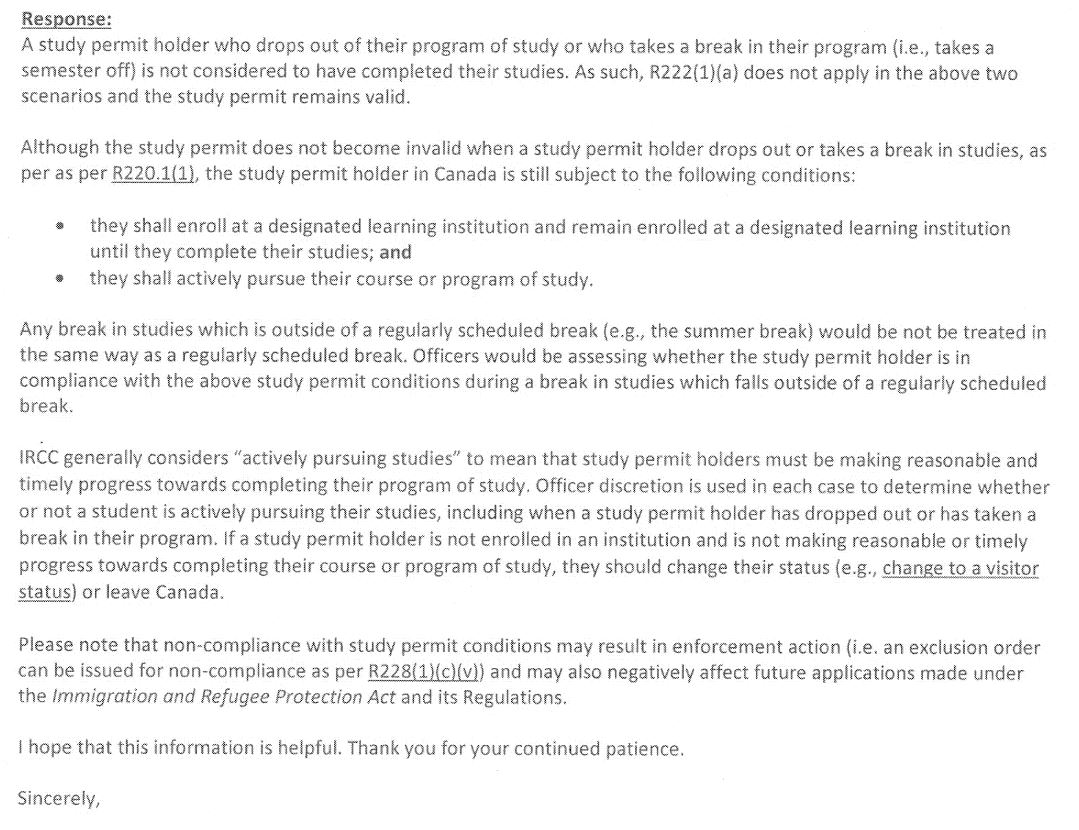Post-Graduate Work Permit Refusals are on the up and up.
My colleague, Steven Meurrens, recently posted a chart showing how in 2016 the refusal rate for PGWPs began to spike:

Source: http://meurrensonimmigration.com/the-post-graduation-work-permit/
I don’t have the numbers but I would suggest 2017 is seeing more of the same
Some of the reasons are understandable:
- Schools that are not eligible for PGWPs (although as I have mentioned a public, national list should be made clear);
- Incorrect fees (failing to pay the open work permit holder fee);
- Expired passports; and
- Incomplete transcripts and deficient completion letters.
One of the reasons I find highly, highly problematic is the requirement that the student be in full-time studies for the entire duration of the studies as defined by the institution.
The current eligibility for PGWPs (all policy – as you may remember from my previous posts) is this:
Who is eligible to participate?
To obtain a work permit under the PGWPP, the applicant must meet the following requirements:
- have a valid study permit when applying for the work permit;
- have continuously studied full time in Canada (i.e., studies must have taken place at a Canadian educational institution) and have completed a program of study that is at least eight months in duration;
- have completed and passed the program of study and received a written notification from the educational institution indicating that they are eligible to obtain a degree, diploma or certificate. The educational institution must be one of the following:
- a public post-secondary institution, such as a college, trade or technical school, university or CEGEP (in Quebec);
- a private post-secondary institution that operates under the same rules and regulations as public institutions;
- a private secondary or post-secondary institution (in Quebec) offering qualifying programs of 900 hours or longer leading to a diploma of vocational studies (DVS) or an attestation of vocational specialization (AVS); or
- a Canadian private institution authorized by provincial statute to confer degrees (i.e., bachelor’s degree, master’s degree, doctorate), but only if the student is enrolled in one of the programs of study leading to a degree, as authorized by the province, and not in just any program of study offered by the private institution.
Applicants must apply for a work permit within 90 days of receiving written confirmation (e.g., an official letter or transcript) from the educational institution indicating that they have met the requirements for completing their program of study. Calculation of the 90 days begins the day the student’s final marks are issued or the day formal written notification of program completion is received, whichever comes first.
http://www.cic.gc.ca/english/resources/tools/temp/students/post-grad.asp
The June 2014 amendments added the requirement to “actively-pursue” studies and made full-time study a requirement so as to encourage international students not to unnecessarily drag out their studies and treating it as a periphery purpose of their stay in Canada.
However, the reality on the ground is that the rule has been applied in an overbroad manner. In recent cases I have seen or heard from includes students who choose to take one less course during the semester and make it up in the summer, students who are prevented from registration due to a lack of space in their required course, and finally medical leaves.

Students who have been refused, do not have the current ability to restore – given the jurisprudence put out by the Federal Court. Many are stuck trying to seek other exemptions to a Labour Market Impact Assessment (a process very difficult for a recent graduate), an option through Provincial Nomination Programs, or restoration to a new study program. All of these are generally prohibitively expensive procedures filled with too much uncertainty.
Issuing Temporary Resident Permits (“TRPs”) for 3 years, while I have seen that on some files, I believe is frankly not a solution. A TRP holder who has been in Canada for three consecutive years can apply for permanent residence even without having completed the required one-year of skilled work experience required of the Canadian Experience Class (for employed work) or the Federal Skilled Worker Program (in the event of contractual /self-employed work).
There is one thing I think all institutions need to do better. I have seen letters of completion from many reputable institutions that simply do not meet the cut from an immigration standpoint. I think some of these institutions, frankly, are opening up themselves to some liability by not having systems in place or resources available for students.
Rather than being contacted or advised that the 90 day window has started running – some of these students are stuck downloading generic letters from portals that do not set out any of the required information for a completion of studies letters.
The follow-up request for transcripts, that often are not finalized – due to the fact graduation has not occurred or that are problematic – due to unexplained or documented credit systems, are fatal to applicants.
From a non-legal perspective, it is simply bad business to take four times the tuition and provide inadequate advisory services to these students.
How should the law change then? More correctly – how should the policy change? – given the policy is itself an object of IRCC discretion perhaps more discretion could be applied to fringe cases. Perhaps a set template or form for letters of completion can be shared with eligible designated learning institutions and a section around discretion or discrepancy can be made into policy. Schools would be forced into taking some time to answering this questionnaire for their students and explaining those minor transcript discrepancies.
I think change has to happen quickly. While our international student program is expanding, the students that are being caught in the middle due to vague reasons and minor mistakes, stain some of the success. I think a fairer approach – that adds some leniency where leniency should be granted – helps all parties.




